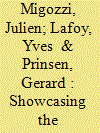|
|
|
Sort Order |
|
|
|
Items / Page
|
|
|
|
|
|
|
| Srl | Item |
| 1 |
ID:
152498


|
|
|
|
|
| Summary/Abstract |
Comparative analyses have found that non-self-governing islands tend to have much better development indicators than sovereign islands. Perhaps unsurprisingly, since 1983 no non-self-governing island has acquired political independence. This paper argues that rather than merely maintaining the status quo with their colonial metropoles, non-self-governing islands are actively creating a new form of sovereignty. This creation of an “Islandian” sovereignty takes place against the backdrop of debates on the relevance of classic Westphalian sovereignty and emerging practices of Indigenous sovereignty. This paper reviews global research on the sovereignty of islands and from this review, develops an analytical framework of five mechanisms that drive the emerging Islandian sovereignty. This framework is tested and illustrated with a case study of the negotiations about sovereignty between New Caledonia and its colonial metropole, France.
|
|
|
|
|
|
|
|
|
|
|
|
|
|
|
|
| 2 |
ID:
163244


|
|
|
|
|
| Summary/Abstract |
With the development of the new Framework for Pacific Regionalism and through collective action on issues such as climate change, home‐grown Pacific regionalism is arguably strengthening. The admission in 2016 of French Polynesia and New Caledonia as full members of the Pacific Islands Forum, however, could potentially shift the balance of policy influence away from Pacific Island members towards that of the Forum's metropolitan members (Australia, New Zealand and now France). While it is early days, this research note makes some beginning observations about where the balance of influence is likely to tilt. We conclude that despite their status as non‐self‐governing territories, New Caledonia and French Polynesia have at times successfully pursued their own interests over those of France and both have much human and economic capital to offer their Pacific Island peers. We also suggest that assuming France's territories will align with the geopolitical interests of Australia and New Zealand and potentially move the Forum back towards a neoliberal agenda, denies the political agency that Pacific Island countries have been increasingly exercising over the Forum's policy. On balance, rather than acting as France's Trojan horse, we argue that the territories’ membership will further strengthen the Pacific canoe.
|
|
|
|
|
|
|
|
|
|
|
|
|
|
|
|
| 3 |
ID:
180646


|
|
|
|
|
| Summary/Abstract |
Oceania includes sovereign states as well as overseas territories of metropolitan powers. In both cases, contemporary geopolitical borders are legacies of colonialism. As in many (de)colonised places, materialisations of spatially anchored social imaginaries and practices of self and otherness, play a role in the everyday politics of Oceania's communities and states. Notably, cultural intimacies (Herzfeld, 2016) in this region are also shaped by tensions between islands in an archipelagic unit. Characterised by plural identities, Oceania's communities must navigate solidarities within the colonial borders of unitary sovereign states or non-sovereign island territories. Given this context, we ask whether spatially anchored identities within archipelagic contexts are politically engaged, playing a role in the politics of state (dis)cohesion across the region. This paper presents findings from 73 interviews across four pairs of Pacific islands – Wallis-Futuna, Tahiti-Mangareva, Rarotonga-Manihiki, Pohnpei-Chuuk – exploring how communities define their own identities and the identity of those on ‘the other island’. We find both sides in agreement on six complementary and rather respectful identities. We therefore suggest that while political tensions and calls for secession in archipelagos are real, it is unlikely that identity politics at this point in time inflames political break ups.
|
|
|
|
|
|
|
|
|
|
|
|
|
|
|
|
| 4 |
ID:
156758


|
|
|
|
|
| Summary/Abstract |
Since 1983, no non-self-governing island connected to a (neo-) colonial European or American metropole has acquired full Westphalian sovereignty and these islands continue to operate within constitutional frameworks that connect them to these metropoles. Large majorities in referendums on several of these islands have rejected full sovereignty. This paper opens with a review of the essential elements of the concept of sovereignty in a historical and global context, before studying how sovereignty is unfolding in new forms in non-self-governing islands in the Pacific and the Caribbean. As a case study, an analysis is presented of how pro-France (loyaliste) and pro-independence (indépendantiste) parties in New Caledonia are negotiating sovereignty with France. Evidence is given of how these New Caledonian parties are creatively using classic Westphalian signifiers of sovereignty normally reserved for sovereign states such as flags, diplomatic representations and international treaties, while still negotiating New Caledonia's sovereignty with France. This suggests that in contrast to Westphalian sovereignty, a unique ‘Islandian’ concept of sovereignty is emerging. Islands that are not sovereign in a Westphalian sense can creatively disassemble and reassemble signifiers of Westphalian sovereignty to strengthen their continuous negotiations with their metropoles and their neighbours.
|
|
|
|
|
|
|
|
|
|
|
|
|
|
|
|
|
|
|
|
|